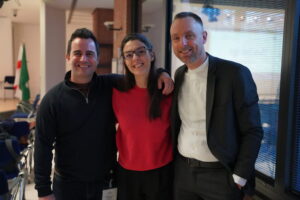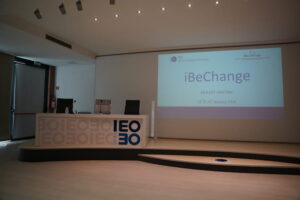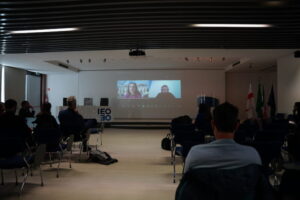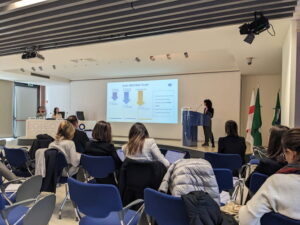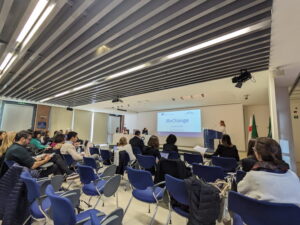The iBeChange project, spearheaded by the European Institute of Oncology (IEO), officially kicked off its first day of meetings, laying the groundwork for the ambitious collaboration aimed at transforming behavioral health through an innovative integrated platform. The meeting commenced with a warm welcome from the project’s Principal Investigator, Gabriella Pravettoni, and Project Officer, Maria Grazia Bonanomi, setting the tone for a highly collaborative and informative two-day event.
Principal Investigator’s Welcome and Overview
Gabriella Pravettoni, representing IEO, extended a cordial greeting to all participants, offering a comprehensive overview of the iBeChange project. She introduced the core team and outlined the ambitious scope of the project, emphasizing its potential to drive behavior change and improve public health outcomes.
Project Officer Maria Grazia Bonanomi followed, underscoring the project’s commitment to transparency. She announced that iBeChange’s data would be published in open-access journals, with all deliverables made public following review and approval by the European Commission. Bonanomi encouraged attendees to register on the European Commission’s website for insights into other related projects, further fostering an environment of knowledge sharing and collaboration.
Work Package Presentations and Q&A Sessions
The meeting’s main agenda featured detailed presentations of the various Work Packages (WPs) that form the backbone of the iBeChange project. Each WP leader presented their plans, followed by a 10-minute Q&A session, fostering an interactive exchange of ideas.
Giorgia Miale, Project Manager for IEO, introduced WP1, focused on project management and coordination, and WP9, which deals with ethics requirements. She discussed the submission process for project deliverables and emphasized the role of the Independent Ethics Advisory Board, which will oversee the project’s compliance with regulatory frameworks, including the forthcoming AI Act and European Health Data Space (EHDS) regulations.
Marianna Masiero, Co-PI for IEO, presented WP2, which aims to design the integrated platform using behaviour change techniques and a user-centred approach. The platform will focus on collaboration between clinical and technical partners, a theme that resonated throughout the meeting, as participants highlighted the importance of hybrid meetings to facilitate cross-disciplinary updates and discussions.
Emilia Ambrosini from Politecnico di Milano (POLIMI) and Carolina Migliorelli presented WP3 and WP4, respectively. WP3 focuses on developing novel interaction methods through a virtual user model, while WP4 is dedicated to creating a personalized recommendation system using reinforcement learning. Both presentations stressed the importance of data sharing among partners and the use of gamification techniques to enhance user engagement.
ICO’s Cristian Ochoa-Arnedo introduced WP5, which is focused on implementing the recommendation system in clinical trials. He outlined the timeline for pilot studies and emphasized the need for collaboration across WPs to ensure timely data provision.
Ricardo Pietrobon (SPOREDATA) highlighted WP6, focusing on assessing the IBeChange System’s impact through a mixed-method approach. This includes qualitative interviews, focus groups, and heuristic evaluations to understand system barriers and inform interface design. A final report will integrate these findings. SPOREDATA stressed the importance of evidence-based, cost-effective evaluation.
Nathan Lea (I-HD) detailed WP7’s focus on ethics, privacy, and legal compliance, including GDPR and AI ACT regulations, alongside the Data Protection Impact Assessment (DPIA).
Denis Horgan (EAPM) presented WP8’s focus on policy alignment, stakeholder engagement, and dissemination, supporting communication and policymaker tools.
Concluding Remarks and Future Steps
The day ended with a reflection by Gabriella Pravettoni on the importance of interdisciplinarity in the iBeChange project. She praised the collaborative efforts displayed during the presentations and reiterated the need for sustained commitment to achieve the project’s goals. Pravettoni also emphasized the significance of outreach, encouraging participants to engage a broad audience in the project’s mission.
The next steps for the iBeChange team include finalizing the project’s data management plan, continuing collaborative discussions through regular bi-weekly meetings, and establishing the Executive and External Advisory Committees to guide the project’s scientific and strategic direction.
With a solid foundation laid during the first day of meetings, iBeChange is poised to make significant strides in behaviour change research and its application to public health. The collaborative spirit and clear strategic direction established during this meeting will be crucial as the project moves forward.
